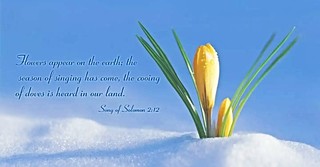
- Recent Translations
- All Translations
Song of Solomon 2:12
Share
Settings
Images for Song of Solomon 2:12

Song of Solomon 2:12 Meaning and Commentary
The flowers appear on the earth
One of the first signs of the spring being come F20; and make the season delightful and pleasant; the sun returning with its warming influences, herbs and plants are quickened and spring up; fields and meadows, as well as gardens, are covered with a variety of beautiful flowers, which make walking abroad very delightful. By these "flowers" may be meant either the graces of the spirit in the saints, which, when a wintertime with them, seem to be dead, at least are hid; but, upon a return of the sun of righteousness, revive and are seen again: or the saints themselves, when in a flourishing condition, and in the exercise of grace; who may be compared to the flowers of the field for the production of them in the spring, which is a kind of re-creation of them, ( Psalms 104:30 ) ; and fitly expresses the renovation of the Holy Ghost, to which the revival of them is owing; and for the fragrancy of them, their persons and services being of a sweet savour through the grace and righteousness of Christ; and for their beauty and ornament to the fields in which they grow, as saints are through Christ in themselves, and to the churches and interest of Christ; and for the gaiety and cheerfulness in which the flowers appear in the spring season, and so a proper emblem of the joy and consolation of the saints; where grace revives, Christ returns, and they are favoured with communion with him. It may not be improper to observe, that this may represent the large conversions of souls to Christ, and the numerous appearance of so many beautiful flowers in the church of Christ in the first ages of Christianity, after a long winter of Jewish and Gentile darkness; the time of the singing [of birds] is come;
another sign of spring, and suits the Gospel dispensation, in which the churches of Christ, and the members of them, sing the praises of the Lord in psalms, hymns, and spiritual songs; and particularly young converts, those little birds that sing in warbling notes and tuneful lays the songs of electing, redeeming, calling, justifying, pardoning, and adopting grace, to the glory of God, and to their mutual comfort and edification. Some render it, "the time of the branch" F21, of the vine putting forth its branches; or "the time of cutting" F23, of pruning vines, of lopping trees, and cutting off unfruitful branches; as in the Gospel dispensation, when the Jewish branches were broken off, and the Gentiles were ingrafted in, and being pruned brought forth more fruit; and this agrees with the season of the year, the spring being the time of cutting and pruning vines F24; though this is by some objected to as unseasonable; and the voice of the turtle is heard in our land;
so one part of rural pleasures is described by the poet F25, not only by the singing of birds of various kinds, but particularly by the note of the turtle; which is a kind of dove that lies hid in the wintertime, or is gone, being a bird of passage, and appears and returns at the spring, when its voice is heard again F26; see ( Jeremiah 8:7 ) ; for its voice is never heard in winter, unless on a fine day F1; by which may be meant, not the voice of the law, as the Jewish writers F2, rather of the Gospel, the joyful sound, which for a while was heard only in the land of Judea, called by way of specialty "our land": but either of the voice of the Messiah himself F3, preaching the everlasting Gospel in the land of Israel when here on earth; or of John the Baptist his forerunner; and so Alshech interprets it of Elijah, who was to come before the Messiah, and refers to ( Malachi 4:5 ) . It may design the voice of all the apostles of Christ, and first ministers of the Gospel F4; or of the Holy Ghost, as the Targum, who appeared as a dove at Christ's baptism; and whose voice in the hearts of his people, speaking peace and pardon, and witnessing their adoption, causes joy and gladness; or of the church itself, compared to a turtledove for its harmlessness, meekness, chastity whose voice in prayer and praise is heard, and is acceptable to Christ, ( Song of Solomon 2:14 ) .
F20 "Ver praebet flores", Ovid. de Remed. Amor. l. 1. v. 188. "Omnia tum florent", ibid. Metamorph. l. 15. Fab. 9. So flowers are called (tekna earov) , "the children of the spring", in Athenaei Deipnosoph. l. 13. c. 9. p. 608. "Vernus sequitur color, omnis in herbas turget humus", Claudian. de Rapt. Proserp. l. 2. v. 90.
F21 (rymzh te) "tempus palmitis", Gussetius, p. 231.
F23 (kairov thv tomhv) , Sept. "tempus putationis", V. L. Pagninus; so the Syriac, Arabic, and Ethiopic versions.
F24 Plin. Nat. Hist. l. 17. c. 22. Hesiod. Opera & Dies, l. 2.
F25 (estene trugwn) , Theocrit. Idyll. 7.
F26 Plin. ut supra, l. 18. c. 28.
F1 Myndius apud Athenaeum in Deipnosophist. l. 9. c. 11. p. 394. So Pliny, "hyeme mutis, vere vocalibus", l. 10. c. 35. Vid. l. 18. c. 28.
F2 In Zohar in Gen. fol. 121. 3.
F3 So Pesikta in Yalkut in loc.
F4 Vid. Stockium, p. 1181.